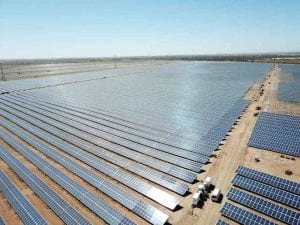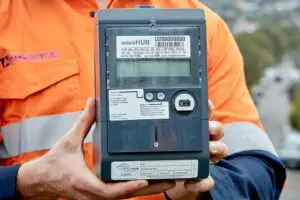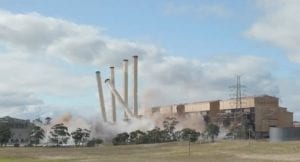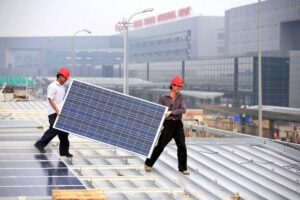Technical standards underpin energy markets. Your air conditioner, your hot water system, a wind turbine, an electric vehicle, these are all built to standards, preferably allowing them to interact with the grid and be a shared resource.
The National Electricity Rules (NER) weren’t written with Distributed Energy Resources (DER), such as air conditioners or solar panels in mind, but as DER become a more and more important part of the energy system, we need to make sure they are designed to smart standards and are included in the NER.
Without these standards in place, DER can’t participate in energy markets on an equal footing with large wind and solar farms.
This is the history of attempts to develop a way of planning for and setting smart DER technical standards.
In 2019:
Stakeholders highlighted DER technical standards as a foundational challenge for DER integration, and as a result the Energy Security Board (ESB) commissioned a review into the governance of DER technical standards in December 2019.
In 2020:
The Sapere and CutlerMerz Review of governance of DER technical standards was completed in March 2020.
On 5 May 2020, the Australian Energy Market Operator (AEMO) submitted a rule change request seeking to establish a framework to enable it to set initial minimum technical standards for DER, principally inverter standard AS4777.2:2020. The rule change request proposed to oblige AEMO to oversee a subordinate instrument under the NER that sets minimum technical standards for DER.
The July 2020 ESB Governance of DER Technical Standards Consultation Paper proposed the establishment of a new governance committee, convened under the Australian Energy Markets Commission (AEMC), to oversee the development of DER technical standards to meet electrical system security requirements, support distribution network management and provide long-term affordability and choice for consumers, including through the sale of DER services.
As the ESB Governance of DER Technical Standards Consultation Paper stated:
The Sapere/CutlerMerz review (the Review) found that the governance of DER technical standards is fragmented, lacking clarity of roles and coordination. In addition, the resources dedicated to the setting of standards is inadequate, and the pace of change is slower than needed given the rapid deployment of DER. The result is that DER systems deployed today are not necessarily able to deliver the performance levels and services required to support system security, efficient and effective distribution network management and the optimisation of DER benefits for all electricity system users.
ESB received 32 submissions to this consultation paper, the vast majority supportive of the proposal to establish a DER Standards Governance Committee and put standards in a subordinate instrument under the NER:
- Twenty-eight were in full support of the ESB’s proposal.
- One wanted greater statutory control for the committee.
- One would support the proposal with their organisation’s involvement.
- One supported the committee, but only as advisory.
As a result, on 16 September 2020, Dr Kerry Schott lodged a rule change request with the AEMC on the Governance of Distributed Energy Resources (DER) technical standards.
In 2021:
On 25 February 2021, the AEMC made a “more preferable final rule” to put AEMO’s proposed an initial set of DER technical standards into the NER, rather than a subordinate instrument under the rules, where they could be more easily updated.
In 2022:
Eighteen months after the Dr Schott rule change was lodged, on 17 March 2022, the AEMC published its final rule determination “not to make a rule” to create new governance arrangements under the NER. The Commission’s final determination was that, “‘using existing powers enables it to promptly commence its next stage of work on DER technical standards in a way that complements work already underway across other organisations”.
In other words, the ESB rule change proposal to address the gap in the governance of DER technical standards had an enormous level of stakeholder support, but was rejected by the AEMC, which decided it could manage the issue of DER technical standards, without any changes to the rules and without upskilling its abilities in DER or technical standards.
Six months later, on 29 September 2022, the AEMC issued a consultation paper for a Review into consumer energy resources technical standards.
In 2023:
Then AEMC commissioned Baker McKenzie to write a Review into consumer energy resource technical standards, which was published in April 2023. It covered in more legal detail the same ground of the Review of the governance of DER technical standards undertaken by Sapere/CutlerMerz for the ESB in 2020.
The AEMC’s Draft Report into consumer energy resource technical standards, issued on 27 April 2023, focused on issues of compliance with technical standards, of which there is only one in the NER, the AS4777.2:2020, which applies to inverters. And, unexpectedly, the AEMC stated, “more work is needed to determine if reform of national technical regulation is needed and, if so, the most appropriate reform model following implementation of the 12 immediate [compliance] draft recommendations”.
On 21 September 2023, the AEMC put out a final report recommending:
“… jurisdictions lead the development of a national regulatory framework for CER technical standards.
This may be progressed as part of the National Energy Transformation Partnership, and would help ensure a more enduring national framework for CER technical standards.
To assist jurisdictions, the AEMC has undertaken a preliminary assessment of four initial reform options for consideration:
- Create a new national technical body.
- Expand the role of the AER and the AEMC under the NEL.
- Expand the role of the CER.
- Enforce national requirements under jurisdictional frameworks.”
The final report states, “Reform is needed to develop an enduring NEM-wide regulatory framework for CER technical standards”, and recommends energy ministers lead the development of a national regulatory framework for CER technical standards.
In other words, 18 months after having rejected the ESB’s rule change to establish new governance arrangements for DER technical standards and deciding that it was capable of managing the development of DER technical standards, and three years after the ESB’s consultation showed there was overwhelming stakeholder support for the establishment of new arrangements for DER technical standards, the AEMC has proposed four new alternative governance arrangements, which it is handing over to jurisdictions for further discussion and consultation.
The result is that the governance of DER technical standards are at least three years behind where they should have been if the AEMC had made the original Dr Schott (ESB) rule change or made an alternative rule for governance arrangements to enable DER technical standards to be decided and, where appropriate, included in the rules or a subordinate instrument under the NER.
This raises a series of questions about the AEMC’s ability to “deliver timely, effective and enduring reforms when they are needed”.
What do these lost years mean?
Many technical standards that could have been developed and adopted by now have not been. Consumers are missing out on the opportunities to earn revenue from their DER because these standards are not in place.
Perhaps the most obvious example is EVs and their charging requirements, which:
“…vary across States and Territories increasing complexity, cost, and confusion among stakeholders. Charging standards are still evolving with short-term fixes being implemented to enable vehicle grid integration. This is resulting in uncertain economic viability and leading to practical difficulties.”
A Race For 2030 Opportunity Assessment of Electrical Vehicles and the grid lists physical connectors, interfaces, power levels, battery standards, energy exchange protocols and vehicle to grid (V2G) communication as areas all needing certainty around standards (see Figure below).
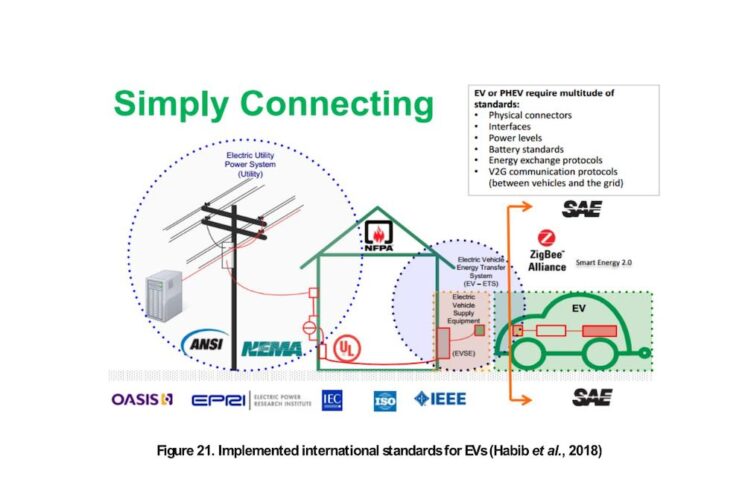
If a technical standards body had been in place for three years, these standards could have been researched and resolved by now, and we could be moving towards smarter managed charging of EVs and better integration of EVs into the grid.
In the three years to 30 June 2023, on EV Council figures, approximately 100,000 EVs were sold. That’s 100,000 lost opportunities for smart standards alone.
It’s time for the energy market bodies to step-up their DER game.
Dr Kuiper was the DER Strategy Specialist with the Energy Security Board from February 2019 to December 2020



